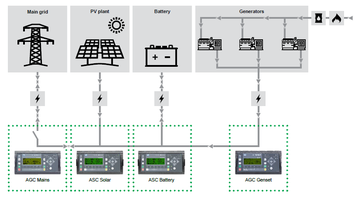Reducing greenhouse gas emissions is central to combating climate change and data centres are not exempt from this; in fact, the need to increase the share of renewables is all the more pressing in a power-hungry industry that is growing fast.
But while reducing carbon emissions is certainly important, so is ensuring uninterrupted uptime. This can be a challenge with renewables, such as wind farms and solar panels, given their inherently unstable nature. However, with intelligent power management systems (PMS) it is possible to efficiently combine traditional and renewable power sources in the data centre power system, and thereby reconcile the need for sustainability and the need for uptime.
Hybrid power requires intelligent control
The controllers in a hybrid PMS play the same role as in a traditional solution: They control each power source and communicate to select the power source to use based on the current load demand. In a hybrid power system with renewables, however, this mission is more complex. The PMS must prioritise renewables but also be ready to instantly switch to mains or genset power if the renewables do not deliver. There are many operating scenarios to take into account. All controllers must be designed for hybrid applications, and they must be compatible and reliable.
Figure 1 shows an example of a hybrid power system PMS with various DEIF AGC-4 and ASC-4 controllers. The system has a battery energy storage system (enabling the operator to store and use power from renewables), and a wind farm could easily be added. The PMS can be configured to prioritise the power sources in any order that suits the operator; for example, using the photo-voltaic plant whenever possible and falling back to battery, mains, or genset power when needed.
Key benefits of the AGC-4 and ASC-4
Several features of the AGC-4 and ASC-4 make them ideally suited for a hybrid power PMS:
- The controllers are designed for compatibility, built by the same manufacturer, and based on the same platform and control logic. As such, they deliver reliable and efficient communication and coordination with load management controllers and building management systems, in addition to dedicated power source control - crucial aspects of effective power management;
- All controller variants have factory defaults and features that are tailor-made for power management. For example, the ASC-4 maximises sustainable power penetration in any operation mode, and the Close Before Excitation feature of the AGC-4 allows any number of gensets to be started in less than 10 seconds if necessary. Both controllers allow the operator to maintain extra capacity on the bus bar through the spinning reserve feature;
- When interlinked over a network, the controllers make up a PMS with full redundancy. If one controller fails, the remaining controllers compensate for the faulty controller until it can be repaired or replaced, continuing all power management tasks unaffected by the device failure.
In addition, DEIF offers several other features that can ease the transition from a traditional mains-and-genset solution to a hybrid setup:
- The AGC-4 and ASC-4 do not require programming but can be configured by setting built-in parameters;
- DEIF provides an emulation solution that lets you design and test the control system from your desktop. When you have designed and tested all control scenarios, system settings can quickly be broadcast to the controllers, and you are ready to install;
- Remote testing features enable you to monitor live installations in order to schedule preventive maintenance effectively and detect signs of problems early on.
Power and resilience with fewer emissions
To sum up: Through continuous communication and control, and by ensuring resilience through design for redundancy, a PMS based on the DEIF AGC-4 and ASC-4 controllers ensures that the necessary power, and therefore uptime, is always available, even with renewables. The data centre operator gets a hybrid power solution that delivers the same power and resilience as a traditional solution, but with far fewer carbon emissions.
Uptime is everything, and green energy cannot be allowed to jeopardise stability. Fortunately, with intelligent power management, you don’t have to choose between uptime and sustainability. Whether you want to reduce carbon emissions because of client requirements, in order to comply with emissions regulations; or because you may be able to save on operating costs because of incentive schemes, controllers such as the DEIF AGC-4 and ASC-4 let you have your cake and eat it, too.
René Kristensen is Uptime Institute ATD-certified Critical Power Specialist at DEIF
Further reading
-

The Sustainability Supplement
How data centers can help the climate
-



